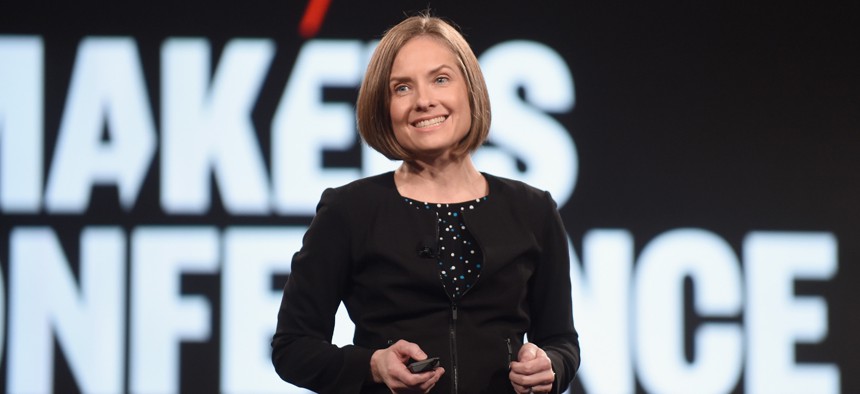Government’s chief data scientist previews agencies’ work on equitable data

U.S. Chief Data Scientist Denice Ross, pictured here at the The 2017 MAKERS Conference , said a progress report on the Biden administration's work on equitable data would be forthcoming. Emma McIntyre / GETTY IMAGES.
U.S. Chief Data Scientist Denice Ross said government agencies are working to build capacity around equitable data, with a progress report on these efforts set to come out soon.
Stakeholders can be on the lookout for a progress report on agencies’ work on equitable data, Denice Ross, U.S. chief data scientist, said during a Friday meeting of the Chief Data Officers Council.
So far, agencies are disaggregating data, adding questions around gender identity and sexual orientation, building agency capacity around data and more as they implement April 2022 recommendations made by an equitable data working group set up by a day-one Biden executive order on racial equity.
The update will be coming from a subcommittee on equitable data in the Office of Science and Technology Policy’s National Science and Technology Council, said Ross.
President Biden marked data as a focus on his first day in office as part of that executive order on racial equity in government, which directed agencies to find and redress any inequities in policies or programs as part of a “whole-of-government equity agenda.”
Equitable data is foundational to its implementation, said Ross. As for what exactly equitable data is, the working group defined it as data that enable assessments of whether government programs and policies are fair and “illuminate” opportunities for actions to improve outcomes for underserved communities.
Some government agencies are already building out equity assessments and internal data dashboards using data that they already have, especially in the areas of procurement and diversity, equity, inclusion and accessibility in the workforce, said Ross.
They are also working on disaggregating data by demographic characteristics like race, gender, disability and income while also protecting privacy, said Ross.
“In many cases this means adding basic demographic questions where they were not before” or “adding more specific demographic questions,” she said.
“Open data are often aggregated to the point where they obscure the acute disparities in our society, leaving many marginalized groups invisible in government programs and policymaking decisions,” said Ross, adding that a “the key recommendation” of the working group was that the “government collects their data in such a way that they can slice and dice it by different characteristics.”
This effort also aligns with ongoing work to update the 1997-era standards that baseline government data on race and ethnicity by summer 2024. Karin Orvis, U.S. chief statistician, released draft recommendations of updates last month, which are open for comment through April 12, 2023.
The area of work seeing the most action by agencies is capacity building, said Ross.
“We see lots of hiring of new data practitioners and the deployment of existing data staff to work on equity assessments,” she said. “Agencies are also training their equity-focused staff on data science and their data science staff on equity issues. Some agencies have started up communities of practice so staff working on equitable data issues can share expertise and tools.”
Finally, agencies are also adding questions around sexual orientation and gender identity.
They can look to a recent report on best practices from the Office of Management and Budget and a new evidence agenda for lesbian, gay, bisexual, transgender, queer and intersex – LGBTQI+ – data as well, said Ross.
Ultimately, the data is meant to inform policy, she said.
“Equitable data is a valuable framework for designing policies and programs, whether it's figuring out who's left behind in workforce support programs, addressing barriers to full representation in higher ed [or] identifying where you should invest in climate resilience,” said Ross. “If we want to design policies and programs that truly result in equitable outcomes, we need to have a clear sense of where the disparities are.”






